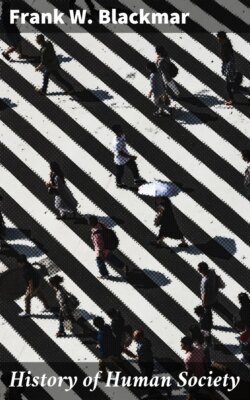Читать книгу History of Human Society - Frank W. Blackmar - Страница 7
На сайте Литреса книга снята с продажи.
PART IV WESTERN CIVILIZATION
ОглавлениеTable of Contents
XII. THE OLD GREEK LIFE
205
The old Greek life was the starting-point of Western civilization. The Aegean culture preceded the coming of the Greeks. The Greeks were of Aryan stock. The coming of the Greeks. Character of the primitive Greeks. Influence of old Greek life.
XIII. GREEK PHILOSOPHY
215
The transition from theology to inquiry. Explanation of the universe by observation and inquiry. The Ionian philosophy turned the mind toward nature. The weakness of Ionian philosophy. The Eleatic philosophers. The Sophists. Socrates the first moral philosopher (b. 469 B. C.). Platonic philosophy develops the ideal. Aristotle the master mind of the Greeks. Other schools. Results obtained in Greek philosophy.
XIV. THE GREEK SOCIAL POLITY
229
The struggle for Greek equality and liberty. The Greek government an expanded family. Athenian government a type of Grecian democracy. Constitution of Solon seeks a remedy. Cleisthenes continues the reforms of Solon. Athenian democracy failed in obtaining its best and highest development. The Spartan state differs from all others. Greek colonization spreads knowledge. The conquests of Alexander. Contributions of Greece to civilization.
XV. ROMAN CIVILIZATION
250
The Romans differed in nature from the Greeks. The social structure of early Rome and that of early Greece. Civil organization of Rome. The struggle for liberty. The development of government. The development of law is the most remarkable phase of the Roman civilization. Influence of the Greek life on Rome. Latin literature and language. Development of Roman art. Decline of the Roman Empire. Summary of Roman civilization.
XVI. THE CHRISTIAN RELIGION
268
Important factors in the foundation of Western civilization. The social contacts of the Christian religion. Social conditions at the beginning of the Christian era. The contact of Christianity with social life. Christianity influenced the legislation of the times. Christians come into conflict with civil authority. The wealth of the church accumulates. Development of the hierarchy. Attempt to dominate the temporal powers. Dogmatism. The church becomes the conservator of knowledge. Service of Christianity.
XVII. TEUTONIC INFLUENCE ON CIVILIZATION
281
The coming of the barbarians. Importance of Teutonic influence. Teutonic liberty. Tribal life. Classes of society. The home and the home life. Political assemblies. General social customs. The economic life. Contributions to law.
XVIII. FEUDAL SOCIETY
294
Feudalism a transition of social order. There are two elementary sources of feudalism. The feudal system in its developed state based on land-holding. Other elements of feudalism. The rights of sovereignty. The classification of feudal society. Progress of feudalism. State of society under feudalism. Lack of central authority in feudal society. Individual development in the dominant group.
XIX. ARABIAN CONQUEST AND CULTURE
304
The rise and expansion of the Arabian Empire. The religious zeal of the Arab-Moors. The foundations of science and art. The beginnings of chemistry and medicine. Metaphysics and exact science. Geography and history. Discoveries, inventions, and achievements. Language and literature. Art and architecture. The government of the Arab-Moors was peculiarly centralized. Arabian civilization soon reached its limits.
XX. THE CRUSADES STIR THE EUROPEAN MIND
319
What brought about the crusades. Specific causes of the crusades. Unification of ideals and the breaking of feudalism. The development of monarchy. The crusades quickened intellectual development. The commercial effects of the crusades. General influence of the crusades on civilization.
XXI. ATTEMPTS AT POPULAR GOVERNMENT
328
The cost of popular government. The feudal lord and the towns. The rise of free cities. The struggle for independence. The affranchisement of cities developed municipal organization. The Italian cities. Government of Venice. Government of Florence. The Lombard League. The rise of popular assemblies in France. Rural communes arose in France. The municipalities of France. The States-General was the first central organization. Failure of attempts at popular government in Spain. Democracy in the Swiss cantons. The ascendancy of monarchy. Beginning of constitutional liberty in England.
XXII. THE INTELLECTUAL AWAKENING OF EUROPE
347
Social evolution is dependent upon variation. The revival of progress throughout Europe. The revival of learning a central idea of progress. Influence of Charlemagne. The attitude of the church was retrogressive. Scholastic philosophy marks a step in progress. Cathedral and monastic schools. The rise of universities. Failure to grasp scientific methods. Inventions and discoveries. The extension of commerce hastened progress.
XXIII. HUMANISM AND THE REVIVAL OF LEARNING
364
The discovery of manuscripts. Who were the humanists? Relation of humanism to language and literature. Art and architecture. The effect of humanism on social manners. Relation of humanism to science and philosophy. The study of the classics became fundamental in education. General influence of humanism.
XXIV. THE REFORMATION
375
The character of the Reformation. Signs of the rising storm. Attempts at reform within the church. Immediate causes of the Reformation. Luther was the hero of the Reformation in Germany. Zwingli was the hero of the Reformation in Switzerland. Calvin establishes the Genevan system. The Reformation in England differed from the German. Many phases of reformation in other countries. Results of the Reformation were far-reaching.
XXV. CONSTITUTIONAL LIBERTY AND THE FRENCH REVOLUTION
392
Progress of the seventeenth and eighteenth centuries. The struggle of monarchy with democracy. Struggle for constitutional liberty in England. The place of France in modern civilization. The divine right of kings. The power of the nobility. The misery of the people. The church. Influence of the philosophers. The failure of government. France on the eve of the revolution. The revolution. Results of the revolution.
